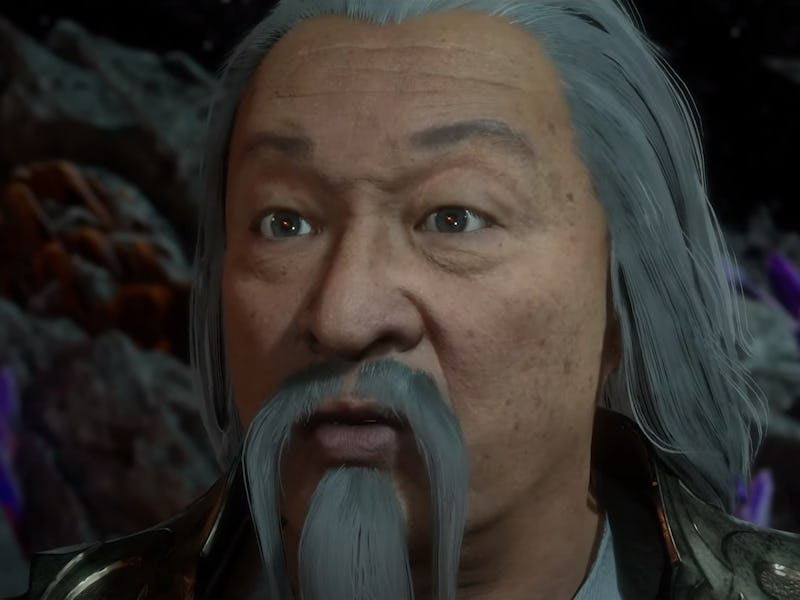Mortal Kombat 11: Aftermath doesn't just change the game, it changes canon
"Your brother's soul is mine. You will be next."

Anyone that grew up in the '90s remembers the 1995 movie Mortal Kombat, where Cary-Hiroyuki Tagawa said those words as the mystical, evil sorcerer Shang Tsung. Now, Tagawa is back in his role of Shang Tsung in the video game Mortal Kombat 11's latest DLC .
While Tagawa was added as a playable character last year, his role now expands into the game's actual canon in the newest downloadable content expansion, titled Mortal Kombat 11: Aftermath.
What is Mortal Kombat 11: Aftermath?
On Wednesday, Mortal Kombat 11 developers NetherRealm Studios released the trailer for Mortal Kombat 11: Aftermath, an expansion that adds new characters, new skin packs, and most of all, a new cinematic chapter that continues the story of Mortal Kombat 11.
On its own, Aftermath will cost $40 for those who already own Mortal Kombat 11. But for those who don't, you can pick up the game and the DLC in a bundle for $50. It will be available May 26 for all platforms Mortal Kombat 11 is available on, including Xbox One, PlayStation 4, Nintendo Switch, PC, and Google Stadia.
Shang Tsung, played by 'Mortal Kombat' actor Cary-Hiroyuki Tagawa, returns to his popular role in a new story contained in 'Mortal Kombat 11: Aftermath.'
The Return of Shang Tsung in Mortal Kombat 11
The most important thing about the Aftermath DLC isn't Robocop (more on him later), it's the new story chapter. Set after the main story where Liu Kang defeats the villain Kronika, the Aftermath trailer shows Liu Kang and Raiden attempting to create a new history. However, they're stopped by Shang Tsung, who steps out of a portal with Nightwolf and Fujin to warn the heroes they're making a mistake.
This is the first time since the 2011 reboot game (where Shang Tsung was unceremoniously killed off) that he plays a major role in the ongoing story. (How does he come back? For now, we'll just chalk it up to time travel.)
That he's also being portrayed by Tagawa, someone so intrinsically connected to the role as Mark Hamill is to Luke Skywalker, is just gravy for fans who still have fond memories watching the original movie on VHS.
"In defeating Kronika you destroyed her crown," Shang Tsung says. "Without it, you can't restart history."
Despite the heroes' unwillingness to work with one of their oldest enemies, a new temporary alliance forms in the game where Liu Kang, Raiden, and Shang Tsung once again go back in time to retrieve Kronika's crown in order to restart history.
While the dramatic question is "Can the heroes trust Shang Tsung?" the real question fans should be asking themselves is, "What will happen to Mortal Kombat canon?" The whole story is about starting a new timeline, which signals the possibility of yet another reboot of the entire Mortal Kombat series. The last time it was rebooted was in 2011's Mortal Kombat, which kicked off the new trilogy that's continued in Mortal Kombat X (2015) and now Mortal Kombat 11 (2019).
What else does Aftermath add to Mortal Kombat 11?
Shang Tsung's return isn't the only thing in the DLC. New playable characters include classic fighters like the four-armed Sheeva, the elder sage Fujin... and RoboCop. Yes, RoboCop, the sci-fi action hero of the retro film series joins the T-800, the Joker, and Spawn as a new guest character. Yes, this means you can actually make the Terminator and RoboCop fight, instead of just rap battle.
Peter Weller, who starred in RoboCop (1987) and RoboCop 2 (1990), reprises his role, just like Tagawa and Keith David as Spawn. (Arnold Schwarzenegger provided his likeness for the Terminator, but personally appointed actor Christopher Cox to voice the T-800.)
The Inverse Analysis — The Aftermath epilogue chapter will put a bow on this era of Mortal Kombat as the series gears up for yet another reboot. Adding Tagawa's Shang Tsung for one final story is an obvious love letter to fans who have played the games for decades. But Aftermath is the end of Mortal Kombat as we know it as NetherRealm prepares a new start for the series, one we'll probably see well into the era of the PlayStation 5 and Xbox Series X.
Co-creator Ed Boon, who continues to oversee the making of the Mortal Kombat games, already confirmed that Mortal Kombat 11 is the end of the story but not of the series. In a video interview with Terra Brasil in October 2019, Boon said:
"The story of Mortal Kombat, we're pretty much calling this one the end of the story, but we're certainly not through with Mortal Kombat... You know, there's more characters that are going to come, and we have a big surprise coming next year for Mortal Kombat."
It's obvious now that the "big surprise coming next year" is now the Aftermath DLC, which brings Shang Tsung back into the story and adds RoboCop to the playable roster. With yet another reboot on the horizon, it will be interesting to see where Mortal Kombat takes its story next.
From 1992 to 2006, the first eight Mortal Kombat games (plus ancillary titles like Mortal Kombat: Shaolin Monks) took place in a single continuity with a linear timeline. But at the end of 2006's Mortal Kombat: Armageddon, Raiden sent a message in time to his past self, which began a new, divergent timeline starting with Mortal Kombat (2011) and now ends with Mortal Kombat 11.
The current trilogy dealt heavily with time travel. What will Mortal Kombat do next to once again restart the story without resorting to that same concept? That, fellow fighters, will be answered another day.
Mortal Kombat 11: Aftermath launches on May 26 for Xbox One, PlayStation 4, Nintendo Switch, PC, and Google Stadia.